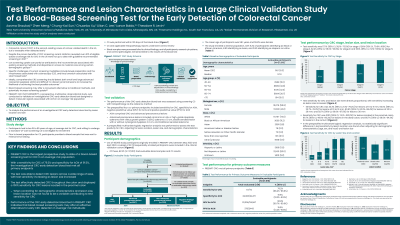Tuesday Poster Session
Category: Colorectal Cancer Prevention
P3871 - Test Performance and Lesion Characteristics in a Large Clinical Validation Study of a Blood-Based Screening Test for the Early Detection of Colorectal Cancer
Tuesday, October 29, 2024
10:30 AM - 4:00 PM ET
Location: Exhibit Hall E

Has Audio

Aasma Shaukat, MD, MPH, FACG
Robert M. and Mary H. Glickman Professor of Medicine; Professor of Population Health; Director, GI Outcomes Research
NYU Langone Health
New York, NY
Presenting Author(s)
Award: Presidential Poster Award
Aasma Shaukat, MD, MPH1, Zhen Meng, PhD2, Chung-Kai Sun, MSc3, Chuanbo Xu, PhD4, Lilian C. Lee, PhD5, Lance Baldo, MD5, Theodore R. Levin, MD, MS, FACG6
1NYU Langone Health, New York, NY; 2Freenome, Lake Forest, CA; 3Freenome, Brisbane, CA; 4Freenome, Inc., South San Francisco, CA; 5Freenome, South San Francisco, CA; 6Kaiser Permanente, Pleasanton, CA
Introduction: Despite various screening options, nearly 40% of eligible US adults are not up to date with colorectal cancer (CRC) screening (Siegel 2023). Comprehensive CRC screening should detect both small and large advanced colorectal neoplasia (ACN) and difficult to discern proximal lesions to optimize effective treatment (Ikematsu, 2021). Blood-based testing offers a promising complementary approach to traditional screening methods and may enhance patient adherence (Schneider 2023). In the PREEMPT CRC study, we evaluated an investigational blood-based screening test for detecting molecular signals of CRC in an average-risk population. The aim of the current analysis is to study the performance of the test by lesion location and size.
Methods: Between May 2020 and April 2022, the study enrolled individuals aged 45-85 at average risk for CRC, who underwent standard of care screening colonoscopy and had a blood sample drawn before bowel preparation. Colonoscopy and applicable histopathology reports underwent central review. Blood samples were processed blind to clinical findings. Co-primary endpoints were CRC sensitivity, non-ACN specificity, non-ACN negative predictive value (NPV), and ACN positive predictive value (PPV).
Results: The study met all primary endpoints: sensitivity for CRC was 79.2% (95% CI 68.4%-86.9%), specificity for non-ACN was 91.5% (95% CI 91.2%-91.9%), NPV for non-ACN was 90.8% (95% CI 90.7%-90.9%), and PPV for ACN was 15.5% (95% CI 14.2%-16.8%). Sensitivity was 57.1% for stage I, 100% for stage II, 82.4% for stage III and 100% for stage IV. Test sensitivity for CRC according to lesion size: 33.3% (95% CI 6.1%-79.2%) for lesions of 6-9 mm, 50.0% (95% CI 23.7%-76.3%) for lesions of 1.0-1.9 cm, 90.9% (95% CI 62.3%-98.4%) for lesions 2.0-2.9 cm, and 92.7% (95% CI 80.6%-97.5%) for lesions of 3.0 cm or larger. CRC sensitivity was 100% (95% CI 74.1%-100.0%) for lesions located in the proximal colon, 66.7% (95% CI 49.6%-80.2%) for lesions in the distal colon and 85.7% (95% CI 68.5%-94.3%) for lesions in rectum.
Discussion: PREEMPT CRC, the largest prospective study of a blood-based CRC screening test, met all primary endpoints. The test showed 79.2% sensitivity for CRC and 91.5% specificity for non-ACN, was able to detect for CRC lesions across a wide range of sizes, and was 100% sensitive for lesions located in the proximal colon. The test may offer a convenient and effective screening option for average-risk individuals.
Disclosures:
Aasma Shaukat, MD, MPH1, Zhen Meng, PhD2, Chung-Kai Sun, MSc3, Chuanbo Xu, PhD4, Lilian C. Lee, PhD5, Lance Baldo, MD5, Theodore R. Levin, MD, MS, FACG6. P3871 - Test Performance and Lesion Characteristics in a Large Clinical Validation Study of a Blood-Based Screening Test for the Early Detection of Colorectal Cancer, ACG 2024 Annual Scientific Meeting Abstracts. Philadelphia, PA: American College of Gastroenterology.
Aasma Shaukat, MD, MPH1, Zhen Meng, PhD2, Chung-Kai Sun, MSc3, Chuanbo Xu, PhD4, Lilian C. Lee, PhD5, Lance Baldo, MD5, Theodore R. Levin, MD, MS, FACG6
1NYU Langone Health, New York, NY; 2Freenome, Lake Forest, CA; 3Freenome, Brisbane, CA; 4Freenome, Inc., South San Francisco, CA; 5Freenome, South San Francisco, CA; 6Kaiser Permanente, Pleasanton, CA
Introduction: Despite various screening options, nearly 40% of eligible US adults are not up to date with colorectal cancer (CRC) screening (Siegel 2023). Comprehensive CRC screening should detect both small and large advanced colorectal neoplasia (ACN) and difficult to discern proximal lesions to optimize effective treatment (Ikematsu, 2021). Blood-based testing offers a promising complementary approach to traditional screening methods and may enhance patient adherence (Schneider 2023). In the PREEMPT CRC study, we evaluated an investigational blood-based screening test for detecting molecular signals of CRC in an average-risk population. The aim of the current analysis is to study the performance of the test by lesion location and size.
Methods: Between May 2020 and April 2022, the study enrolled individuals aged 45-85 at average risk for CRC, who underwent standard of care screening colonoscopy and had a blood sample drawn before bowel preparation. Colonoscopy and applicable histopathology reports underwent central review. Blood samples were processed blind to clinical findings. Co-primary endpoints were CRC sensitivity, non-ACN specificity, non-ACN negative predictive value (NPV), and ACN positive predictive value (PPV).
Results: The study met all primary endpoints: sensitivity for CRC was 79.2% (95% CI 68.4%-86.9%), specificity for non-ACN was 91.5% (95% CI 91.2%-91.9%), NPV for non-ACN was 90.8% (95% CI 90.7%-90.9%), and PPV for ACN was 15.5% (95% CI 14.2%-16.8%). Sensitivity was 57.1% for stage I, 100% for stage II, 82.4% for stage III and 100% for stage IV. Test sensitivity for CRC according to lesion size: 33.3% (95% CI 6.1%-79.2%) for lesions of 6-9 mm, 50.0% (95% CI 23.7%-76.3%) for lesions of 1.0-1.9 cm, 90.9% (95% CI 62.3%-98.4%) for lesions 2.0-2.9 cm, and 92.7% (95% CI 80.6%-97.5%) for lesions of 3.0 cm or larger. CRC sensitivity was 100% (95% CI 74.1%-100.0%) for lesions located in the proximal colon, 66.7% (95% CI 49.6%-80.2%) for lesions in the distal colon and 85.7% (95% CI 68.5%-94.3%) for lesions in rectum.
Discussion: PREEMPT CRC, the largest prospective study of a blood-based CRC screening test, met all primary endpoints. The test showed 79.2% sensitivity for CRC and 91.5% specificity for non-ACN, was able to detect for CRC lesions across a wide range of sizes, and was 100% sensitive for lesions located in the proximal colon. The test may offer a convenient and effective screening option for average-risk individuals.
Disclosures:
Aasma Shaukat: iterative health; Freenome – Consultant.
Zhen Meng: Freenome Holding, Inc. – Employee.
Chung-Kai Sun: Freenome – Employee. Verily – Employee.
Chuanbo Xu indicated no relevant financial relationships.
Lilian C. Lee: Freenome – Employee.
Lance Baldo: Freenome – Employee, Stock Options.
Theodore Levin: Freenome, Inc – Grant/Research Support.
Aasma Shaukat, MD, MPH1, Zhen Meng, PhD2, Chung-Kai Sun, MSc3, Chuanbo Xu, PhD4, Lilian C. Lee, PhD5, Lance Baldo, MD5, Theodore R. Levin, MD, MS, FACG6. P3871 - Test Performance and Lesion Characteristics in a Large Clinical Validation Study of a Blood-Based Screening Test for the Early Detection of Colorectal Cancer, ACG 2024 Annual Scientific Meeting Abstracts. Philadelphia, PA: American College of Gastroenterology.

